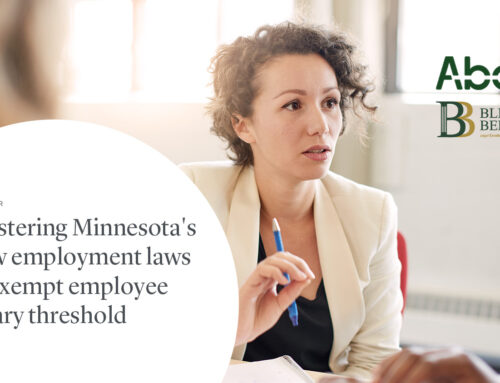The Minnesota Earned Sick and Safe Leave Act (ESSL) is a new act of legislation that will go into effect on January 1, 2024. Here’s what you should know before the law is put into action during the new year:
What is the new ESSL law?
The ESSL applies to all employers in Minnesota, from large corporations to small local businesses. Under this bill, full- and part-time employees working for at least 80 hours per year can earn up to 1 hour of time off for every 30 hours of work, with a limit of 48 hours accumulated each year and an 80-hour cumulative total with carry-over hours. This time is to be used for paid time off if employees or their family members are ill, face a threat to their safety, need to recover from illness or injury, the employee’s place of business has been closed due to weather or other public emergency, or their family member’s school or place of care has been closed due to weather or public emergency.
Employers have the option to provide ESSL leave to their employees by front-loading at the start of the year or by allowing employees to accrue it over time. If employers choose to front-load ESSL leave for their employees, they can choose to front load either 48 or 80 hours. If they choose to front load 48 hours, they must pay out any remaining hours not used at the end of the year. If employers choose to have employees accrue ESSL over the course of the year, employees will begin accruing ESSL leave on the first day they are employed on or after January 1, 2024.
The new law does not require employers to pay out unused ESSL leave when an employee leaves the company, though some employers may choose to do so.
What do I need to do as an employer?
Now is the time for employers to start planning on how they will comply with the law when it goes into action in 2024. Employers must update existing handbooks with ESSL information. This change will likely impact other existing policies, so it is important for employers to truly understand the ins and outs of the ESSL. Additional training for managers and supervisors may be necessary as well, as they are often the point of contact if employees have questions regarding ESSL policies.
Blethen Berens can help you prepare.
The ESSL is a complex law and employers should consult with an attorney to ensure they are in compliance. Employers who do not comply with the new ESSL standards may be subject to fines. Don’t leave this up to chance and schedule a meeting with one of the employment law attorneys at Blethen Berens. Julia Corbett, Alyssa Nelson, or Beth Serrill can help you navigate the new ESSL law and make sure things are ready to go come January 1st.
The employment law attorneys at Blethen Berens also partnered with Abdo to present a webinar on the new ESSL law. Information from this meeting and a recording of the webinar can be found here.


